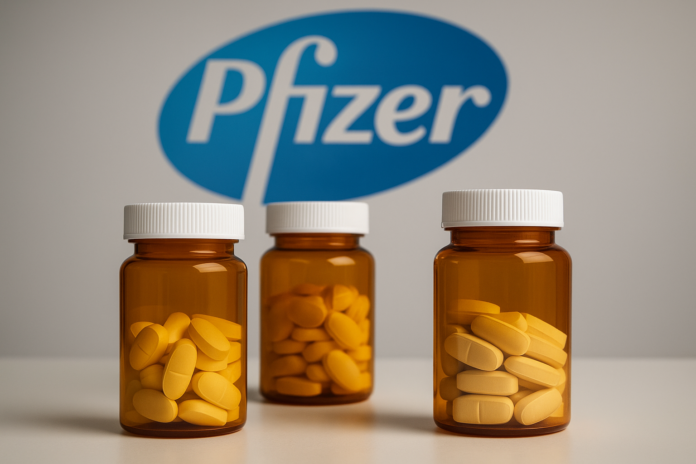
The Trump administration announced on Tuesday that it has reached a deal with Pfizer aimed at lowering the cost of prescription drugs in the United States, while also easing tariff pressures on the pharmaceutical industry.
Under the arrangement, Pfizer will make many of its medications available at heavily reduced prices through Medicaid and will participate in a new federal website, TrumpRx, scheduled to launch in early 2026. The site will allow Americans to purchase medicines directly at discounted rates, with some treatments offered at reductions of up to 85 percent.
In return, the company will receive relief from tariffs that were set to apply to branded and patented drug imports. The agreement provides Pfizer with a three-year grace period as long as it continues to invest in U.S. manufacturing. Company executives said they plan to commit $70 billion toward domestic production and research facilities.
President Donald Trump highlighted the deal as a breakthrough in his push to link U.S. prices with those paid abroad. He said the policy would “bring Medicaid costs down” and predicted that other pharmaceutical firms would soon follow Pfizer’s example.
Pfizer Chief Executive Albert Bourla described the agreement as creating greater certainty for the company while expanding access for patients. He noted that the arrangement satisfies demands the White House outlined earlier this year when it pressed drugmakers to cut costs or face steep tariffs.
Shares of Pfizer rose sharply after the announcement, and stock prices of other large drugmakers also increased on expectations they may negotiate similar arrangements. Investors appeared relieved that the concessions were targeted rather than sweeping across the entire sector.
According to Pfizer, a range of medicines will be discounted. Treatments for conditions such as menopause symptoms, eczema, rheumatoid arthritis, and migraines will be offered at much lower prices than before. For example, a menopause therapy currently costing more than $200 could be available for about $30 through TrumpRx, while an eczema treatment may drop from over $800 to about $160.
The new platform represents the administration’s attempt to bypass some of the pricing complexities involving insurance companies and pharmacy benefit managers. Still, health policy experts caution that the overall effect on out-of-pocket costs for consumers remains uncertain, since many factors contribute to what patients ultimately pay.
The deal is part of a broader effort by the White House to pressure drugmakers into aligning U.S. costs with those in Europe and other advanced economies. Letters sent to 17 companies earlier in the summer demanded price reductions, with a deadline of September 29 to respond. Pfizer was the first to announce compliance, while other firms, including Eli Lilly, are reported to be in talks.
More than 70 million Americans are covered by Medicaid, which provides health insurance for low-income individuals and families. While the program represents a smaller portion of overall drug spending compared to Medicare, analysts note that the changes could still bring relief to states struggling with rising costs.
Whether the approach ultimately reshapes drug pricing in the United States will depend on how many companies enter similar deals and whether the discounts extend beyond Medicaid. For now, the Pfizer agreement gives the administration a public example of progress while leaving open questions about the broader impact on the pharmaceutical market.
This image is the property of The New Dispatch LLC and is not licenseable for external use without explicit written permission.